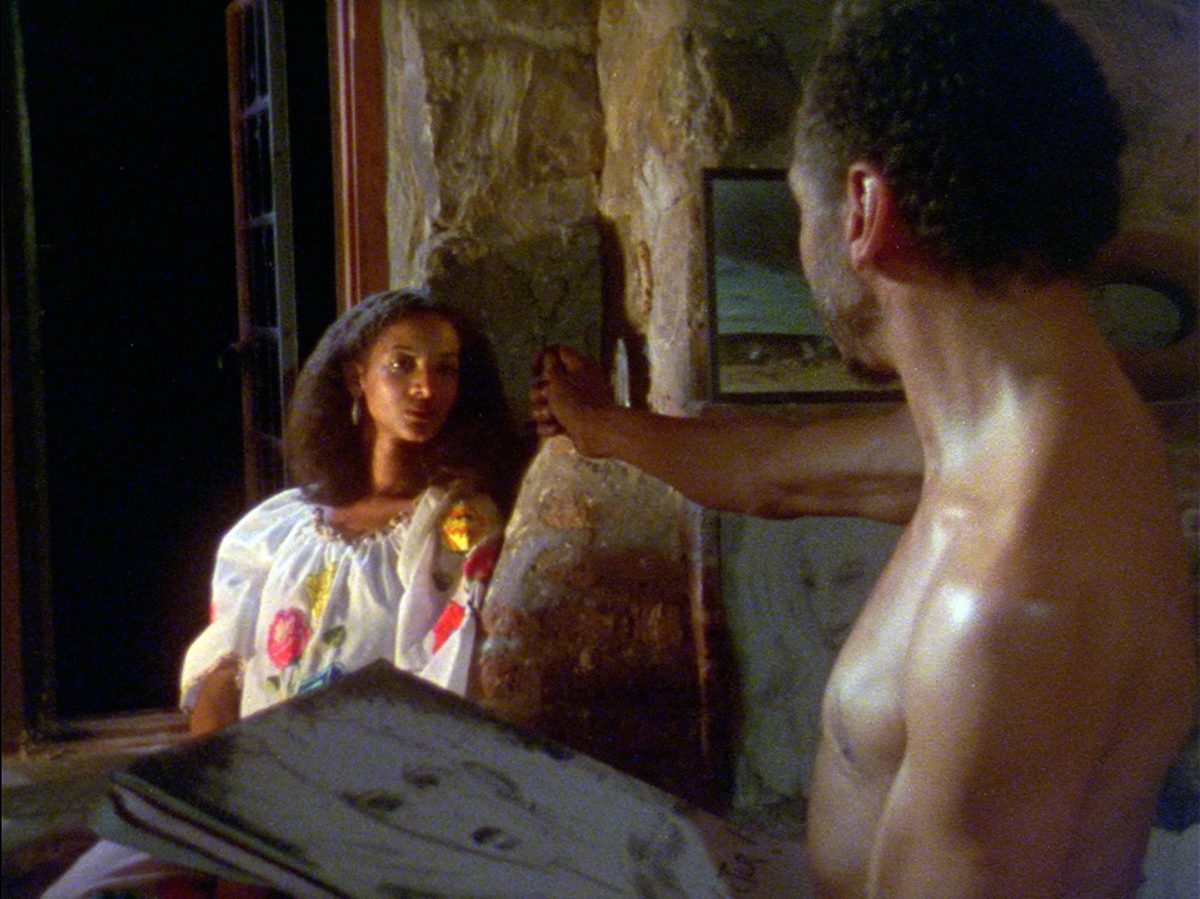
“Nothing I do leads to ecstasy,” Sara (Seret Scott) exclaims to her handsome painter husband Victor (Bill Gunn) in a fit of frustration. “You stay in a trance, you haven’t noticed that? A kind of private, ecstatic trance. It’s like living with a musician who sits around all day blowing his horn.” We don’t see Victor’s reaction, but he replies: “What’s the matter? Hegel and the boys let you down?” Sara is a philosophy professor — an occupation that seems to bore Victor. The contempt for his wife’s intellectual pursuits is clear in his tone, as is his distaste with their emotional limitations. The two are perfect opposites. Victor’s work is abstract, playful and sensual. He dresses casually in T-shirts and jeans, and works odd hours based almost entirely on inspiration. Sara thrives in a classroom structure, dressed primly in nice blouses and long skirts. When Victor suggests they get a house upstate for the summer, the first thing she wants to know is the whereabouts and selection of the nearest library. Perhaps a bit inspired by her husband’s artistic joy, she decides to write an analytical paper on the ecstatic experience. And through her studies, she finds herself and her marriage unraveling.

In 1982, when Kathleen Collins’s Losing Ground (her second feature) premiered at festivals, it was not picked up for theatrical distribution. (It would be nearly another decade before Julie Dash’s Daughters of the Dust became the first narrative feature directed by a Black woman to get a theatrical release in the US.) It seems audiences didn’t know what to do with a film made by and about a Black intellectual woman in a complicated marriage. With its pacing and style influenced by the naturalistic arthouse films of the ’70s, Losing Ground is a Black film unlike any other in its time. The movie was restored in 2015 thanks to efforts by Collins’s daughter, Nina, with a physical release from Milestone Films coming the following year. In 2020, it was added to the National Film Registry. And now in 2022, this very special film turns 40, at a time when platforms like the Criterion Channel and resources like Maya Cade’s Black Film Archive are doing their best to give classic Black films the recognition they’ve always deserved.

As Sara, Scott expertly plays a Black woman desperately trying to cling to an image of propriety, even as it threatens to constrict the rawer parts of herself. Though it’s an academic pursuit, Sara seems to be using her paper as a way to channel a bolder, more sexual part of her personality. “I could be another Dorothy Dandridge,” she purrs, baffling Victor, whose mind is mainly on himself and barely registers his wife’s restlessness. Victor can’t imagine Sara as a sultry woman. Their primary sexual activity seems to mainly consist of sparring, with him teasing her constantly. “Are you pretty, or is it just the light?” he asks while she poses for a painting. With her doe eyes, full lips, and svelte figure, there’s no doubting Sara’s beauty, but Victor always wants his wife on her toes, aware of how fickle his affection can be. When she meets the mysterious Duke (Duane Jones), Sara sees an opportunity to move through the world the way her husband does. While she spends more time with Duke, Victor begins pursuing Celia (Maritza Rivera), a free-spirited Puerto Rican woman who has become his new muse.

Victor and Duke both resemble men in Collins’s broader body of fiction and screenwriting. Since she died of breast cancer at just 46 in 1988, a good deal of this work went unreleased for years, eventually collected in the books Whatever Happened to Interracial Love? (2016) and Notes From a Black Woman’s Diary (2019). In these stories, men are handsome, intelligent, mysterious, and ultimately unreliable creatures, prone to depression and suicide. Like Sara, many of Collins’s protagonists are women trying to navigate volatile relationships with such men, from fathers and uncles to boyfriends and husbands. Mainly taking place in the ’60s and ’70s, the stories provide a different lens on the Civil Rights Movement and its aftermath, focusing on women navigating love, sex, and activism during a transitional time in history. The conflict between the carnal and the political, specifically in stories featuring interracial relationships, reveals the difficulty Black women face while navigating racial and gender bias at the same time. A Collins protagonist is always hyper-aware of how she is perceived.
Even now, Losing Ground feels revelatory, in part perhaps due to its disinterest in justifying the existence of its characters. The general absence of white people lets the film discuss Blackness from an internal, existential framework. Specifically, Collins welcomes analysis regarding the way media portrays Black women as emotionally and intellectually tethered to the men in their lives. Sara’s pursuit of ecstasy is an intentional rejection of the narrow way her husband (and by extension the world) sees her. Beyond the dutiful wife or stereotypical seductress is a truer portrayal of Black women that combines the sexual and the intellectual, allowing us to be understood as complex beings.
Losing Ground is available to stream via Criterion Channel, Vimeo, and Kino Now.
0 Commentaires